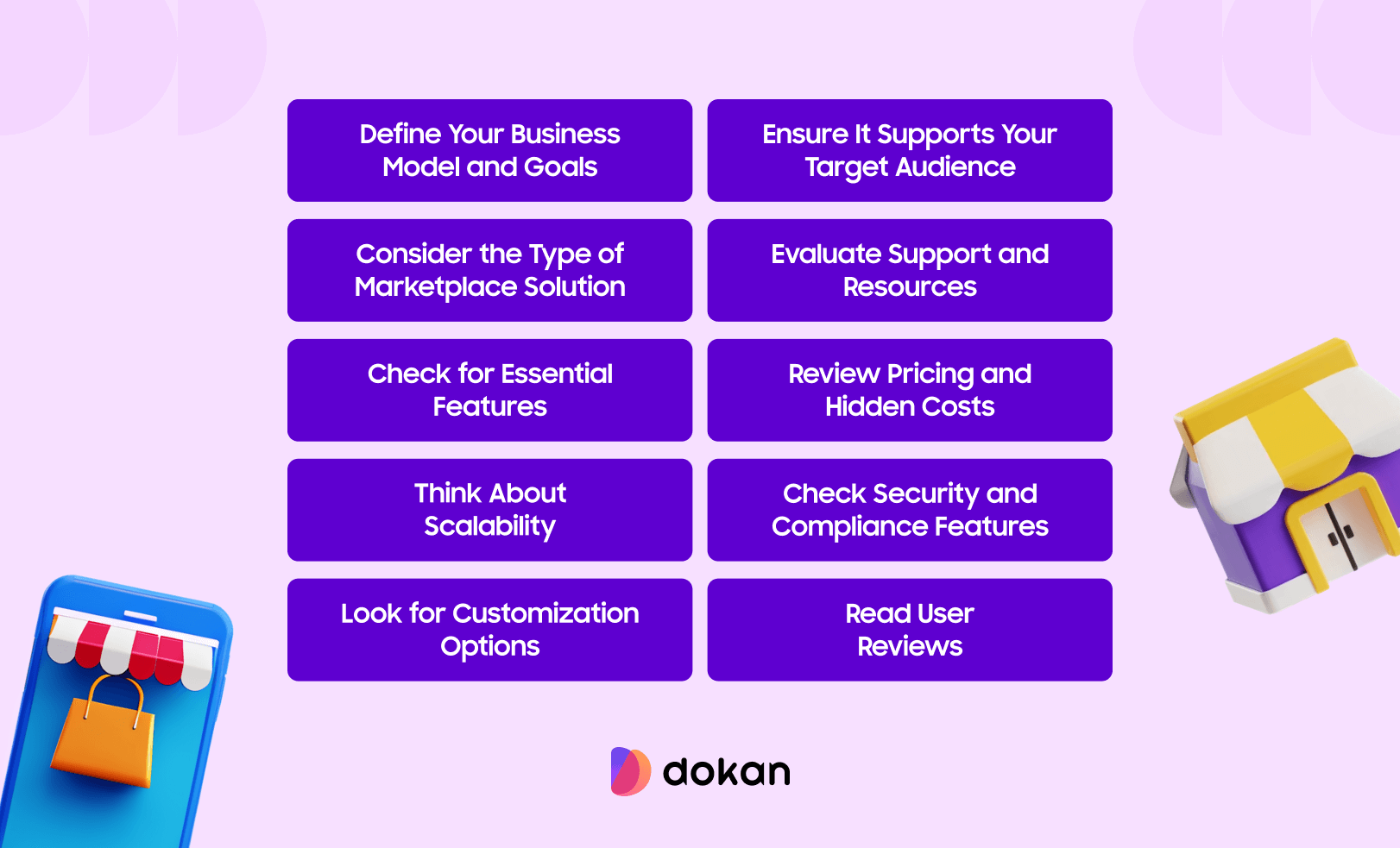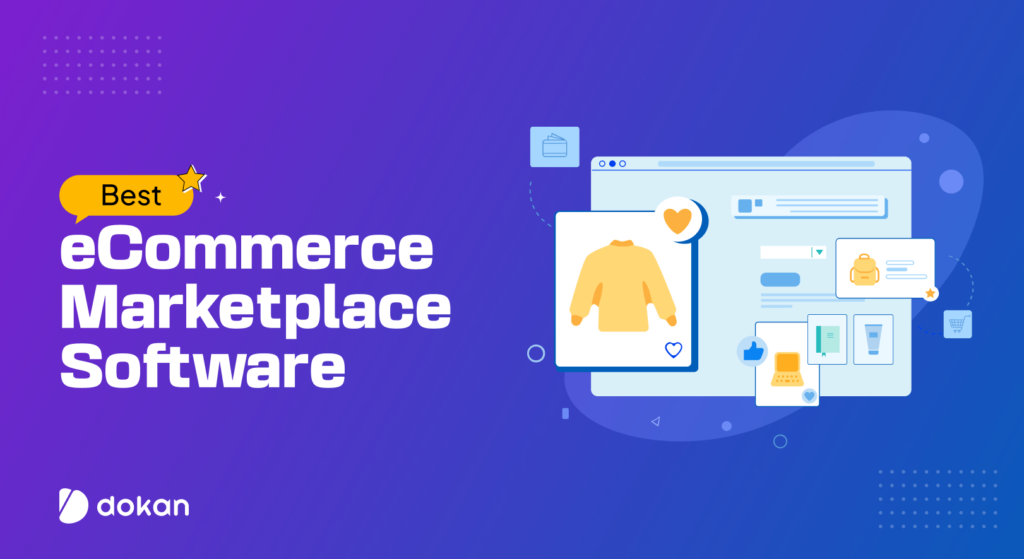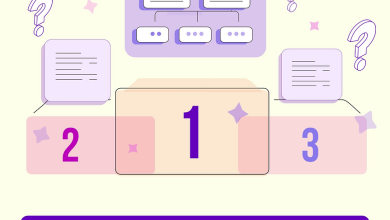Checklist to Buy a Marketplace Solution
[ad_1]
Thinking about starting your own online marketplace? That’s exciting! But before you jump in, there’s one important thing you need to figure out: the right marketplace solution.
With so many options out there, it’s easy to feel a little overwhelmed.
It’s not just about picking something that works now but also finding a platform that grows with your business.
In this guide, we will break everything down for you. You’ll get a complete checklist to buy the most-suited marketplace solution for you.
Let’s get started!
What is a Marketplace Solution?
A marketplace solution is a tool or platform that helps you build and manage an online marketplace. It acts as the foundation for your website, where multiple sellers can list their products or services, and buyers can browse, purchase, and interact.
These solutions simplify the process of setting up and running a marketplace. They offer features like –
- vendor management
- payment processing
- order tracking, and
- commission handling.
Instead of building everything from scratch, a marketplace solution gives you pre-built tools to customize and launch your platform quickly.


Types of Marketplace Solutions for You
When choosing a marketplace solution, you have two main options: self-hosted platforms and hosted platforms.
If you don’t know much about each of the platforms, no worries. Let us break down these two platforms in the easiest way possible for you!
1. Self-Hosted Platform (WordPress + a Multivendor Plugin)
A self-hosted platform means you host the website yourself which gives you full control over your marketplace. For example, you can use WordPress with a multivendor plugin like Dokan to build your marketplace.
With this option, you:
- Get complete control over customization and design.
- Have the flexibility to add features as your marketplace grows.
- Handle your hosting, security, and maintenance.
However, it does require some technical knowledge, especially when it comes to managing hosting and handling updates. You’ll also be responsible for things like backups and ensuring your site is secure.
2. SaaS Platform
A SaaS (Software as a Service) platform is a ready-made, hosted solution. It’s an all-in-one service where you pay for access to a marketplace platform that’s already hosted for you. Some popular examples are Dokan Cloud, Shopify, and Sharetribe.
With SaaS, you:
- Don’t need to worry about hosting, security, or maintenance.
- Can get started quickly since the platform is pre-built.
- Pay a subscription fee based on the plan you choose.
The downside? Customization options may be more limited compared to a self-hosted platform, and you might face higher ongoing costs depending on your needs.
These are the two main types of marketplace platforms that we would like to offer you to create your own online marketplace.
Also check: Vertical vs Horizontal Marketplace – Everything in 10 Minutes.
When You Should Buy a Marketplace Solution


Deciding when to buy a marketplace solution depends on where you are in your business journey. There could be mainly two states:
- you already have a business and now you want to expand it, or
- you have an idea and now you want to start a marketplace business.
Now let’s find out a few scenarios when you should buy a marketplace solution and check yourself if you are in any of these states.
I. You’ve Identified a Niche or Market Need
The first step in creating a marketplace is identifying a gap or need in the market. If you’ve found an area where buyers and sellers could benefit from connecting online, that’s your signal to move forward.
Whether it’s a marketplace for handmade goods, local services, or unique digital products, understanding your niche will guide your decision in choosing the right solution.
II. You Have a Clear Vision of Your Business Model
Are you planning to earn through commissions, subscriptions, or listings? Knowing your revenue model is crucial.
If you’re clear on how you plan to make money from your marketplace, it’s time to choose a solution that allows for flexibility in terms of fees, commissions, and subscription options. A marketplace solution helps you set up these models efficiently and lets you focus on the bigger picture.
III. You Want a Fast Launch Without Building from Scratch
Building a marketplace from the ground up can be a huge task. If you want to get your business off the ground quickly, a marketplace solution gives you a head start.
It’s a ready-made platform that provides essential features like payment processing, vendor management, and product listings—all set up for you. If you’re eager to launch but lack the technical skills to build a platform from scratch, buying a marketplace solution is the way to go.
IV. You’re Facing Growth Pains
If your marketplace is growing faster than your ability to manage it manually, that’s a clear sign it’s time to level up.
For example, if you’re finding it hard to keep track of multiple vendors, manage orders, or handle payments efficiently, investing in a marketplace solution will give you the tools to handle this growth seamlessly.


Subscribe to
Dokan blog
V. You’re Looking to Offer a Seamless User Experience
One of the biggest reasons to buy a marketplace solution is to provide a smooth experience for both buyers and sellers.
If your current setup is clunky or lacks key features like real-time updates, easy navigation, or instant notifications, it’s a signal that the right solution could take your platform to the next level. A polished, easy-to-use marketplace can boost customer satisfaction and drive growth.
A Checklist to Buy a Marketplace Solution


When you’re ready to buy a marketplace solution, it’s important to ensure that the platform you choose meets your business needs and goals. To make the process easier, we’ve created a checklist that covers all the key things to consider.
By going through this checklist, you’ll be able to confidently choose the right solution for your marketplace, no matter if you are just starting the business or scaling up.
Let’s get started!
01. Define Your Business Model and Goals
Before buying a marketplace solution, it’s crucial to have a clear understanding of your business model and goals. This step is the foundation of your marketplace.
What Do You Want Your Marketplace to Do?
Think about the core function of your marketplace. Will it connect buyers and sellers of products? Or will it focus on services, like freelancers or local services? Defining this early on will guide your decision on the features and design you need.
How Will You Make Money?
There are many ways to monetize your marketplace. Common options include:
- Commission-Based: Take a percentage of each transaction between buyer and seller.
- Subscription-Based: Charge sellers a recurring fee to list their products or services.
- Listing Fees: Charge sellers a one-time fee to list their products or services on your platform.
Decide which model works best for your business. Knowing this helps you pick a marketplace solution that supports your chosen revenue stream and ensures you can grow your business effectively.
02. Consider the Type of Marketplace Solution
When choosing a marketplace solution, you need to decide whether you want a self-hosted platform or a hosted solution. Both options have their pros and cons, so think carefully about what suits your needs best.
Self-Hosted Platform
A self-hosted platform like WordPress with a multivendor marketplace plugin (like Dokan) gives you full control over your marketplace.
You can customize everything, from design to features, as it’s hosted on your own server or through a hosting provider. This option works well if you want more flexibility and are comfortable with a bit of technical setup.
Pros:
- Full control over your platform
- More customization options
- Potentially lower long-term costs (if you manage hosting yourself)
Cons:
- Requires more technical knowledge or help from a developer
- You’re responsible for updates, security, and maintenance
Hosted Platform
A SaaS (Software as a Service) marketplace solution, like Dokan Cloud, is an all-in-one platform where the hosting, security, and updates are handled for you. This is a good option if you want to get started quickly without worrying about the technical side.
Pros:
- Quick setup, with no technical expertise needed
- Ongoing support and maintenance included
- Reliable hosting and security
Cons:
- Limited customization (depending on the provider)
- Ongoing subscription fees (can be higher over time)
By deciding on the type of platform, you’ll be able to narrow down your options and choose a solution that fits both your business model and technical ability.
03. Check for Essential Features


When looking for a marketplace solution, it’s important to ensure it comes with the essential features you’ll need to run your platform smoothly. Here are a few key features to check for:
- Multivendor Support: Your marketplace should allow multiple sellers to register, list products or services, and manage their own stores. Make sure the solution supports this feature, as it’s what makes your platform a marketplace. You want a smooth process for sellers to join and manage their products.
- Secure Payment Integration: Your marketplace solution should support secure payment gateways like PayPal, Stripe, or credit card processors. This ensures that both buyers and sellers can transact safely. Check for features like escrow payments, which hold the funds until both parties confirm the transaction, providing extra protection.
- Easy Vendor Management: Managing vendors is one of the most important tasks in a marketplace. The platform should allow you to easily approve, reject, and monitor vendor activities. Features like tracking commissions, managing vendor profiles, and allowing vendors to easily upload products or services will make your job much easier.
04. Think About Scalability
Scalability is an important factor to consider, especially if you plan to grow your marketplace in the future. As your business grows, your marketplace should be able to handle increased traffic, more vendors, and a larger product catalog. Here’s what to think about:
- Handling More Vendors: As your platform grows, you’ll attract more sellers. Make sure the solution you choose can handle an increasing number of vendors without slowing down or losing functionality. A scalable solution will allow you to add more sellers without facing technical limitations.
- Supporting More Customers: A growing marketplace will naturally bring in more buyers. Ensure that the solution can handle an increase in customer traffic. This includes fast loading speeds, reliable uptime, and the ability to manage large numbers of transactions without errors.
- Product Catalog Expansion: The solution should also allow you to expand your product catalog without any issues. As you add more products or services, the platform should remain user-friendly and organized for both sellers and buyers.
A scalable platform ensures that your marketplace can grow smoothly and handle the demands of an expanding business. Look for solutions that offer easy upgrades, additional features, or the ability to integrate with other tools as you scale.
05. Look for Customization Options
Your marketplace needs to reflect your unique brand. The platform you choose should allow you to easily customize the design and layout to match your style. This includes:
- Design Flexibility: You want a platform that gives you control over the look and feel of your site. This includes customizing color schemes, fonts, logos, and the overall layout. A marketplace that offers drag-and-drop design tools or theme customization options will help you quickly make changes without needing advanced technical skills.
- Personalized User Experience: Customization goes beyond the design. It should also allow you to personalize how users interact with your platform. This can include custom fields, unique filtering options, or special promotional sections for featured products or vendors. The more you can tailor the platform to your needs, the better it will align with your business goals.
Having this flexibility ensures that your marketplace stands out and provides a consistent and professional look for your customers and vendors, which builds trust and strengthens your brand.
06. Ensure It Supports Your Target Audience
A good marketplace solution should provide an easy and pleasant experience for both buyers and sellers. Make sure the platform is user-friendly for everyone, with features that cater to both groups:
- Easy Navigation: Buyers and sellers should be able to find what they need quickly and easily. The marketplace should have simple, clear navigation that helps users easily browse products, manage their accounts, and complete purchases. A clean, intuitive layout is key to reducing bounce rates and encouraging return visits.
- Mobile Responsiveness: With more people shopping and selling from their phones, your marketplace needs to look and work great on mobile devices. Ensure the platform is fully responsive, meaning it adjusts smoothly to different screen sizes.
- Buyer and Seller Dashboards: The platform should offer separate, easy-to-use dashboards for both buyers and sellers. Buyers need an efficient way to track their orders, save favorites, and review products. Sellers need tools to manage inventory, track sales, and communicate with customers.
When your platform offers a great experience for both buyers and sellers, it increases engagement, drives more transactions, and helps build loyalty.
07. Evaluate Support and Resources


When you choose a marketplace solution, it’s important to consider the kind of support available. Running a marketplace can get complicated, and you’ll want to know that help is there when you need it.
- Live Chat & Customer Support: Check if the platform offers live chat or direct customer support. Having access to real-time assistance can be a lifesaver when you run into problems. Look for solutions that provide 24/7 support, so you’re not left waiting for help during crucial moments.
- Documentation & Tutorials: A well-documented platform can save you a lot of time. Make sure the solution provides clear documentation, step-by-step guides, and tutorials to help you set up and maintain your marketplace.
Having these resources in place ensures that you’ll be able to handle any technical difficulties that arise without too much hassle.
08. Review Pricing and Hidden Costs
Understanding the full cost of your marketplace solution is crucial. While many platforms offer upfront pricing plans, there could be additional costs hidden in the fine print. Here’s what to do:
- Compare Pricing Plans: Look at the pricing structure of the platform. Does it offer a flat fee, or are there tiered plans based on features or the number of vendors? Make sure the pricing fits your budget and that you’re getting good value for the features included in the plan.
- Understand Additional Fees: Be aware of any extra costs for transactions, updates, or add-ons. Some platforms charge a commission on each sale, while others might charge extra for premium features like advanced reporting or marketing tools. Make sure you know about any additional fees so there are no surprises down the road.
Related resource: How Much Does It Cost to Build a Marketplace Website.
09. Check Security and Compliance Features
Security is critical when running an online marketplace. You’ll be handling sensitive data, like customer payment information, so the platform must have strong security measures. Look for these key features:
- SSL Encryption: SSL (Secure Socket Layer) encryption ensures that all data transferred between your users and your platform is secure. This is essential for protecting personal and financial information. Make sure the platform provides SSL as part of its standard offering.
- Payment Gateway Integrations: Check if the platform integrates with trusted and secure payment gateways like PayPal, Stripe, or other secure providers. These integrations help protect users’ financial data and ensure smooth transactions.
- GDPR Compliance: If you’re operating in or dealing with customers from the European Union, GDPR compliance is essential. This regulation ensures that customer data is handled properly and protects user privacy.


10. Read User Reviews
Before finalizing your decision, it’s a good idea to look at what real users have to say about the platform. User reviews and case studies provide valuable insights into the platform’s strengths and weaknesses.
Look for feedback from users who are in similar situations to yours:
- What are the common praises or complaints?
- Are users generally satisfied with the features, support, and overall experience?
Honest reviews can give you a clearer picture of what to expect.
Reading user reviews will help you make a more informed decision by giving you a sense of how the platform performs in everyday use.
Best Marketplace Options for You


Choosing the right marketplace solution really depends on your needs and preferences. Whether you’re looking for more control over your platform or want something that’s easy to set up and manage, there are great options available.
Dokan Multivendor Plugin (Self-hosted Solution)
If you’re looking for full control over your marketplace and have some technical flexibility, a self-hosted solution like Dokan Multivendor Plugin might be exactly what you need.
With this solution, you can easily create and manage your own marketplace using WordPress, which powers millions of websites worldwide.
The beauty of using Dokan is that it’s designed for vendors and marketplace owners. You can customize everything—from the marketplace design to the features that vendors and buyers need.
It gives you complete freedom to shape the user experience, integrate with other tools, and control how everything runs. Plus, if you’re familiar with WordPress, you’ll find it relatively simple to maintain your site.
What makes Dokan stand out is the scalability and the range of features it offers, such as multivendor support, product management, and built-in payment gateways. As your business grows, you can easily expand your marketplace with modules that suit your evolving needs.
Dokan Cloud (Hosted Solution)
If you prefer a simpler, more hands-off approach, Dokan Cloud might be a great fit. It’s a hosted solution, so you won’t have to worry about server maintenance or software updates. With Dokan Cloud, everything is taken care of for you, and you can focus on growing your marketplace instead of managing technical details.
Dokan Cloud is also built on the same powerful features as the self-hosted plugin, but it’s optimized for ease of use. The setup process is quick, and it’s a great choice if you’re looking for a more streamlined experience.
Plus, it provides secure hosting and reliable performance, so you can rest easy knowing that your marketplace is in good hands.
Both Dokan Multivendor Plugin and Dokan Cloud are trusted solutions used by many successful marketplace owners. Whether you want full control with a self-hosted option or prefer the convenience of a hosted solution, you’ll find that both can provide everything you need to start and grow your online marketplace.
Conclusion – A Quick Recap for You
Choosing the right marketplace solution is a big decision, but it doesn’t have to be overwhelming. Now you have a checklist to buy a marketplace solution for you.
That being said, here is a quick recap of the checklist:
- Define your business model and goals.
- Decide between a self-hosted platform or a SaaS solution.
- Look for essential features like multivendor support and secure payments.
- Ensure the platform is scalable for future growth.
- Check for customization options to match your brand.
- Evaluate the available support and resources.
- Review pricing plans and hidden costs.
- Confirm security and compliance features.
- Read user reviews and case studies for real feedback.
So, which solution are you going to buy for you? Share your thoughts, confusion, or feedback using the comment box below. We would love to hear from you. Happy selling!
Subscribe to
Dokan blog
We send weekly newsletters, no spam for sure!


[ad_2]
منبع:dokan



